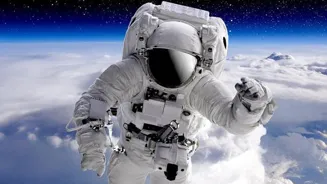Unveiling Astronaut Training: What It Takes to Reach the Stars! Dive into the intense regimen shaping space explorers
Space exploration, a field brimming with excitement and challenges, requires extraordinary
individuals. But what really makes these astronauts so exceptional?
It's not just about being brainy or physically fit, it's also about the incredible training they go through before they even dream about blasting off into the cosmos.
Getting ready for a space mission is a long, hard process, filled with simulations, studies, and experiences that will push astronauts to their absolute limits. Let's pull back the curtain and take a look at what it takes to become an astronaut, ready to venture into the great unknown.
From learning to operate complex spacecraft to adapting to the harsh conditions of space, the rigorous training regime transforms ordinary individuals into extraordinary representatives of humanity.
Astronauts master spacecraft in intense simulators for space challenges
One of the most important parts of astronaut training is mastering the spacecraft. Remember, these machines are super complex! Astronauts spend hours and hours in simulators that are exact copies of the real thing. They learn every switch, button, and system inside out.
They practise normal operations, how to dock with the International Space Station (ISS), and most importantly, how to handle emergencies. These simulators can recreate almost any scenario they might encounter in space, from equipment failures to changes in orbit.
They even simulate issues with the landing. This intense practice ensures they are calm and make good decisions, even when things go wrong in the middle of space. It is critical that the astronauts can control the vessel manually; if necessary, in the event of a malfunction.
Simulators provide a safe and controlled environment for astronauts to hone their skills and build confidence, preparing them for the real-world challenges of spaceflight.
Astronauts train underwater to simulate space conditions
Astronauts not only train in simulators, but also spend a lot of time underwater. Think of it like this: being in space is similar to being underwater, because you are weightless.
NASA and other space agencies have giant underwater pools, called Neutral Buoyancy Laboratories and astronaut candidates spend hours working in these environments, wearing mock spacesuits. The suits are carefully weighted so, when submerged, they experience a similar weightless effect of space.
They practice conducting experiments, working with tools, and simulating spacewalks to repair a satellite, all underwater. This training helps with muscle memory so they perform effectively in space where the absence of gravity often makes simple tasks difficult.
This underwater training is vital for preparing astronauts for the tasks they will perform outside the spacecraft, enabling them to work efficiently and safely in the harsh environment of space.
The water offers a controlled environment where they can develop muscle memory and adapt to the freedom of movement that weightlessness provides.
Astronauts study science to excel in space missions, make discoveries, and inspire others
Understanding the science behind their mission is also crucial for astronauts. They study a wide range of subjects, including astronomy, physics, geology, and biology. They need to know a lot about the cosmos, Earth and how space travel impacts the human body.
Imagine having to fix a science experiment in space. You need to know why the experiment is needed, and also know how it works. Some astronauts concentrate on a specific area of science or engineering. They learn to conduct experiments in space, fix equipment, and collect data.
This also helps them communicate science to the public when they come back to Earth. This knowledge empowers them to make informed decisions, troubleshoot problems, and contribute to scientific discoveries during their missions.
They act as scientists, engineers, and ambassadors, representing the best of human ingenuity and knowledge in the vastness of space. Astronauts who become effective in their training contribute to future missions.
Astronauts train in team-building for space missions' success
Space can be a very tight place to live in for long periods. Astronauts need to get along, communicate well, and work as a team. They participate in team-building exercises and simulations that mimic the stress and isolation of spaceflight.
These exercises help them learn how to resolve conflicts, support each other, and maintain morale, even under pressure. They also learn about cultural differences, especially when working with international teams on the International Space Station.
They often have to work with people with very diverse backgrounds, from different countries. They participate in wilderness survival activities together, pushing personal limits in harsh conditions.
Sometimes, an instructor will pose unexpected conditions on a mission, to simulate a crisis in outer space. The focus is to evaluate team dynamics, to analyze how candidates collaborate, and to gauge the level of trust and support they provide to one another when under duress.
These skills are essential for ensuring the success of the mission and the well-being of the crew.
Astronauts undergo rigorous physical and mental training for space missions
Lastly, there's the physical and psychological preparation. Astronauts must endure extreme environments. They have to cope with radiation, G-forces (the force exerted when exposed to acceleration), isolation, and disrupted sleep cycles.
They undergo rigorous physical training to maintain their bone density and muscle mass. They follow strict diets, and are examined by medical professionals regularly.
They receive counselling and training to manage the psychological challenges of spaceflight, such as stress, anxiety, and homesickness. They develop strategies for staying calm, focused, and motivated throughout the mission.
This rigorous training makes sure that they are physically and mentally ready to handle the unique demands of space travel.
The astronaut's physical and psychological state also ensures that they can make sound decisions under pressure, maintain a positive attitude, and work effectively with their crewmates throughout the mission.
After all, a healthy body and a sound mind are vital for ensuring the success of any space endeavor.
AI Generated Content. Glance/InMobi shall have no liability for the content

















